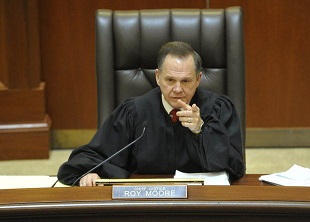By Brandon Moseley
Alabama Political Reporter
On Wednesday, January 28, the Southern Poverty Law Center (SPLC) filed a judicial ethics complaint against popular Alabama Supreme Court Chief Justice Roy Moore (R) for his comments regarding the controversial recent ruling by Federal Judge Callie Granade, declaring that Alabama’s Marriage Protection Act and Sanctity of Marriage Amendment violate the Equal Protection and Due Process Clauses of the Fourteenth Amendment to the United States Constitution.
This time the SPLC filed their ethics complaint against Alabama’s Chief Justice Roy Moore over his pledge to defy federal law and enforce Alabama’s Constitutional ban on same-sex marriage which was ratified by 81 percent of Alabama’s voters.
The President of the SPLC, Richard Cohen wrote, “This morning, we filed an ethics complaint against Alabama Chief Justice Roy Moore over his public statements urging the governor and state judges to defy federal law and continue to enforce Alabama’s ban on same-sex marriages.”
President Cohen wrote, “We’ve been down this road with Moore before. Many around the country know him as the ‘Ten Commandments judge.’”
Cohen reminds us that, “In 2003, we filed an ethics complaint over Moore’s open defiance of a federal court order requiring him to remove his giant Ten Commandments monument from the courthouse. That complaint led to his removal from office.”
Cohen lamented, “Unfortunately, Alabama voters elected him chief justice again three years ago.” “Now, he’s at it again – confusing his personal religious beliefs with his duty to uphold both State and Federal law, including the US Constitution.”
Cohen said, “Our complaint spells out three specific violations of Alabama’s Canons of Judicial Ethics: his improper comments about pending cases; his lack of faithfulness to the law; and his disrespect for the integrity of the judiciary.”
Like 2003, the complaint was filed with the Judicial Inquiry Commission of Alabama. 12 years ago the Commission recommend that Moore face ethics charges in the Alabama Court of the Judiciary. That court then removed Moore from his office after Chief Justice Moore refused to comply with an order from a Federal judge to remove a Ten Commandments monument from the Alabama Supreme Court Building.
SPLC President Cohen said, “Moore is once again wrapping himself in the Bible and thumbing his nose at the Federal courts and Federal law. As a private citizen, Moore is entitled to his views. But as the chief justice of Alabama, he has a responsibility to recognize the supremacy of federal law and to conform his conduct to the canons of judicial ethics.”
Cohen said. “The chief justice is trotting out the same tired – and disproven – states’ rights arguments that were used to disenfranchise African Americans. Even if Moore isn’t a student of history, you would think he would be a student of his own history. The opinion that removed him from the bench in disgrace more than a decade ago clearly explained why he can’t ignore the federal courts.”
Cohen said, “It’s an open secret that Moore wants to run for governor again in Alabama.” Cohen accused Judge Moore of wrapping himself in demagoguery to further his political career.
Cohen wrote, “Moore’s action is unethical, irresponsible, and lawless. It’s precisely what got him removed from office the first time. For the sake of all Alabamians who believe in the rule of law, we hope the result is the same this time. The people of Alabama elected Moore to be a judge, not a pastor.”
Specifically in the complaint, the SPLC said that in the January 27, 2015 letter Moore sent to Governor Robert Bentley (R) addressing the Granade ruling was written on Supreme Court of Alabama letterhead. Moore instructed Governor Bentley that the definition of marriage is biblical and therefore beyond the reach of the federal courts. The SPLC also strongly objected to Moore’s calling the ruling, “Judicial tyranny.”
In the complaint the SPLC wrote that, “Chief Justice Moore released the letter to the press and gave interviews to the media regarding the letter. In an interview with WSFA television, Moore states that “forty-four federal courts and 22 states have bowed down to the tyranny of the federal government” but that “Alabama isn’t doing that” and that “we will have a confrontation” if the district court’s order is enforced.”
The SPLC complaint argues that Chief Justice Moore’s actions violate Alabama’s Canons of Judicial Ethics in numerous and significant regards. “First, the letter and press interviews constitute “public comment.” According to press accounts, Chief Justice Moore decided to write the letter after receiving press inquiries regarding his reaction to the recent ruling holding the marriage 3 restrictions unconstitutional. He then gave interviews to the press regarding the letter and the substance of the ruling. Rather than simply replying that the Canons of Judicial Ethics prevented him from speaking publicly about pending cases.”
The complaint states that, “Chief Justice Moore penned and made public a letter to the Governor, expressing his reaction to the ruling and urging defiance. Second, Chief Justice Moore’s public comment expressly addresses a “pending case.” The case is the widely reported case of Searcy v. Strange, No. 1:14-cv-00208-CG-N (S.D. Ala.), in which U.S. District Judge Callie V.S. Granade on January 23, 2015, entered a Memorandum Decision and Order declaring that Alabama’s marriage restrictions violate the United States Constitution.”
The complaint continues, “Third, Chief Justice Moore’s letter and press interviews also improperly address “impending cases.” It is no secret that legalization and recognition of same-sex marriages in this state may meet resistance, both public and private, and that related disputes almost certainly will end up in this state’s courts. Family relations matters, for example, including those relating to divorce and adoption, typically are heard in state court. Indeed, the plaintiffs in the Searcy case 4 previously had litigated the question whether their out-of-state marriage provided a basis for a second-parent adoption in Alabama State court.”
They also complained that Moore in his letter instructed Alabama’s Probate Judges that issuing licenses to same sex couples would be contrary to law: “I would advise them that the issuance of such licenses would be in defiance of the laws and Constitution of Alabama,” Moore wrote.
The SPLC wrote, “It is difficult to imagine a more patent and undeniable violation of the prohibition against public comment on “impending” cases than for the sitting Chief Justice to advise an entire class of judges on how they must rule on what likely will be hundreds of license applications to be filed in just two short weeks. Chief Justice Moore has violated Canon 3(A)(6) in this regard as well.”
The complaint also accused Judge Moore of a lack of faithfulness to the law and failure of professional competence: “Chief Justice Moore also has violated his responsibility “to be faithful to the law and maintain professional competence.” See Canons of Judicial Ethics 3(A)(1). He denies the supremacy of federal law and maintains that it is trumped by the Alabama constitution and biblical principles. See Exhibit A at 1-2. In doing so, Chief Justice Moore has demonstrated complete disregard of and disdain for one of the foundational principles of our constitutional system—the Supremacy Clause of the United States Constitution.” “Chief Justice Moore has himself taken an oath to uphold the federal constitution, even if there are other sources of authority he agrees with or prefers. This is simply “Constitutional Law 101” – a principle that every first-year law student at every law school in every state in the Union would grasp instantly. Chief Justice Moore’s express rejection of this foundational principle evidences either a lack of faithfulness to a principle of law that is beyond dispute or an utter lack of competence that renders him subject to discipline.”
The SPLC complaint also accused Moore of disrespect for the dignity of the judiciary and of undermining public confidence in the integrity of the judiciary: “Chief Justice Moore’s letter and comments in the press assault the authority and integrity of the federal judiciary and publicly urges Alabama’s Governor to join him in opposing its purported “tyranny.” His letter thereby violates two related Canons of Judicial Ethics.” “Canons 1 and 2 command Chief Justice Moore to act to preserve the integrity and public confidence in the integrity of “the judiciary.” Chief Justice Moore is duty bound to uphold the integrity “the judiciary” as the impartial branch of our government to which all Alabamians – Christian or Jew, man or woman, gay or straight – can turn for justice or for protection from government overreach or intrusion. His wild and unfounded invocation of purported federal judicial “tyranny” directly undermines, and indeed appears intended to undermine, public confidence in the federal judiciary.”
The SPLC claims that, “Chief Justice Moore attempts to conscript a virtual army of state officials and judges, whom he hopes to array in unified defiance of the federal judiciary. This threatened confrontation is unethical, irresponsible, and lawless.”
The SPLC requests that this Judicial Inquiry Commission investigate their allegations and recommend that Chief Justice Moore face charges in the Court of the Judiciary.



















































